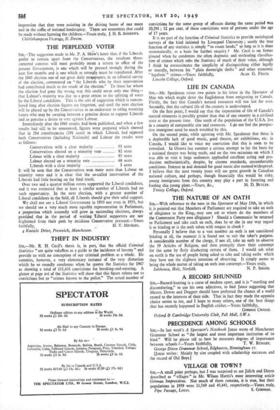THE PERPLEXED VOTER
SIR,—The suggestion made in Mr. P. A. Shaw's letter that, if the Liberals prefer to remain apart from the Conservatives, the resultant three- cornered contests will most probably mean a return to office of the present Government, is one which will be pressed strongly during the next few months and is one which as strongly must be repudiated. After the 1945 election one of our great daily nelapapers, in an editorial survey of the election, commented on "the Liberals who by their intervention :had contributed much to the result of the election." To those for whom • the election had gone the wrong way this could mean only one thing— that Labour's majority was due to a great extent to the splitting of votes by the Liberal candidates. This is the sOrt of suggestion which is remem- bered long after election figures are forgotten, and until the next election Will be played up by the Conservatives in an endeavour to 'swing wavering voters who may be swaying between a genuine desire to support Liberals and as genuine a desire to vote against Labour.
Immediately after the 1945 results had been published, and when a few results had still to be announced, figures were prepared which showed that in 284 constituencies (291 seats) in which Liberals had opposed both Conservatives (including Nationals) and Labour the results were as follows : Conservatives with a clear majority 53 seats Conservatives elected on a minority vote 82 seats Labour with a clear majority 85 seats Labour elected on a minority vote .68 seats Liberals with a clear majority 3 seats It will be seen that the Conservatives won more seats than Labour on minority votes and it is clear that the so-called intervention of the Liberals had little bearing on the final result.
Over two and a quarter million voters supported the Liberal candidates, and it was estimated that at least a similar number of Liberals had no such opportunity. In the next election, with a greater number of Liberal candidates in the field, all Liberals should give their solid support.
We shall not see a Liberal Government in 1950 nor even in 1955, but we should see a very much more equable representation in Parliament, a proportion which assuredly will grow ip succeeding elections, always provided that in the period of waiting Liberal supporters are not frightened from their path by insidious Conservative pressure.—Yours










































 Previous page
Previous page